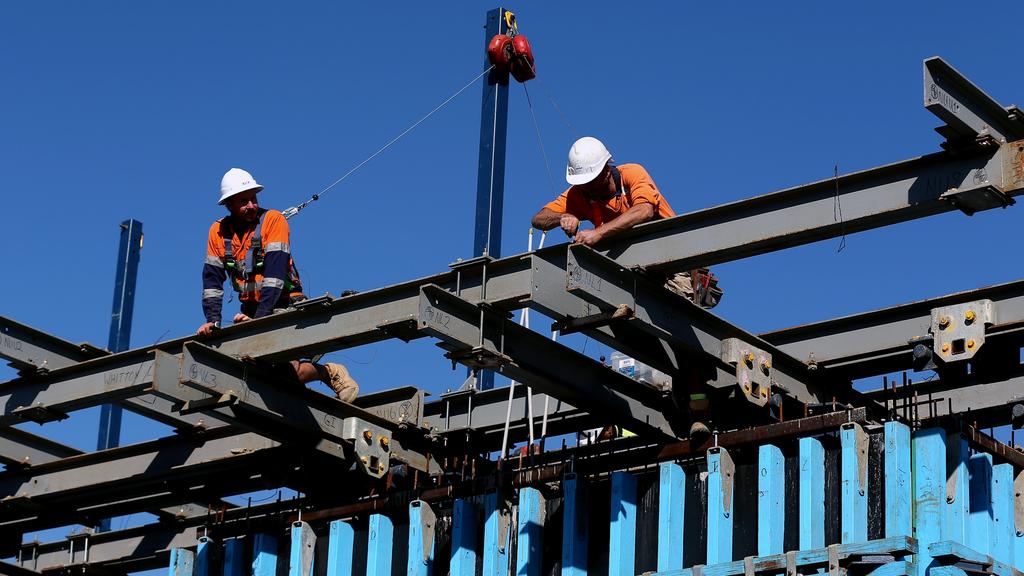Builders rewrite contract terms as failures hit sector

Workers at a construction site of the Whitton Lane residential and commercial project, built by Hutchinson Builders, in Sydney. Picture: Brendon Thorne/Getty Images.
Most of Australia’s builders expect revenues to rise this year as they put in place new contract conditions to help fend off challenging construction conditions.
The embattled building industry has been blighted by a series of collapses across volume home-building, high-rise constructors and civil works companies.
But the industry is reacting, with more than half (51.6 per cent) of respondents to professional services firm RSM Australia’s 2023 Property & Construction Report implementing new terms to combat the delays in delivery and price escalations.
The report found that tender time frames are dropping from six months to just 60 days, builders are using longer contract terms, fluctuating “rise and fall” price contacts, and putting caps on weather and inflation risks, to protect their operations, RSM national leader of property and construction, Adam Crowley, said.
“Construction firms should be taking the necessary steps to draft contractual clauses that allow for time delays in sourcing materials without penalties, while better managing cashflow and sourcing of materials they use regularly,” Mr Crowley said.
“Implementing and understanding the systems, processes, procedures and technology available to construction businesses will also mean any potential issues are identified early, allowing operations to pivot or renegotiate before running into financial difficulty,” he said.
The moves have come following a tumultuous 12 months for construction companies after lengthy delays, cost increases and labour shortages, creating the pressures which drove the collapse of several large home builders, including Porter Davis, Oracle Homes and PBS Building.
Interest rates are expected to pose the most significant risk to business operations and revenue forecasts this year, with concerns over rising material costs and unpredictable weather appearing to persist.
But despite the seemingly gloomy outlook, almost three in five (58.1 per cent) business leaders believe their revenue will rise in 2023.
“Challenges have compounded, from interest rates to major cost increases for shipping, fuel and materials, plus continuing chronic labour shortages and supply chain issues – and one of the wettest years on record,” Mr Crowley said.
“While the challenges are immense, there are actions businesses in this sector can take to protect themselves, and there are definite growth opportunities in 2023 for those prepared to innovate and diversify their operations,” he said.
Earlier this week, Hutchinson Builders boss Scott Hutchinson said construction firms needed to ensure they were working with trusted clients and subcontractors to survive.
“There is strong demand for property, with builders struggling to keep up with supply, trade and material shortages and costs, exacerbated by the impact of Covid-19,” Mr Hutchinson said.
“Ironically, in these boom times, many builders slip into negative profit territory, as the rising cost of labour, products and services on fixed-price contracts present a real test of a builder’s management skills … a test at which some fail.”
Mr Crowley said there was little fat in anyone’s budget to make a misstep or blunder. “Leading construction companies are prioritising their communications and interactions with clients, providing transparency around financial risk and partnering on joint venture transactions and developments,” he said.
RSM Australia surveyed 40 leading property builders, developers and investors in April for the report.







